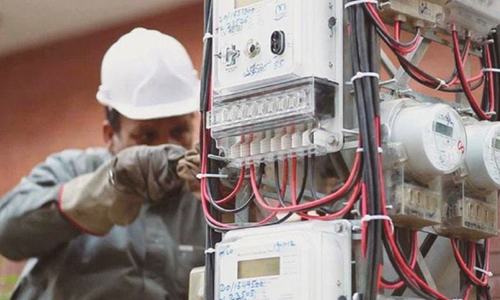ISLAMABAD: Pakistan has started the renegotiation process with foreign lenders to defer steep increases in electricity tariff it had committed for reviving the International Monetary Fund (IMF) programme along with $500 million disbursement and $2.5 billion international bond.
As an alternative plan, the government is now working to “rationalise general sales tax on electricity, purchase some old oil-fired independent power plants (IPPs) and secure some other savings through debt restructuring of power plants”, Special Assistant to the Prime Minister on Power and Petroleum Tabish Gohar told Dawn.
The government will on Tuesday try to convince the World Bank to secure some time.
Informed sources told Dawn that before formally taking over as finance minister, Shaukat Tarin had held a meeting with the relevant ministers where all ministers, prime minister’s advisers and special assistants agreed to push for renegotiations with the lenders to secure some breathing space for the people and the economy.
Govt working on a plan to rationalise GST on electricity, purchase old IPPs, secure savings through debt restructuring of power plants
The government has now firmed up its position that after a recent Rs1.95 per unit increase in electricity tariff, another Rs1.39 is just not possible to be passed on to the consumers in a short period. “We would like this second increase pushed back to December 2021 or January 2022,” said an official.
The outcome would depend on negotiations.
The government had under Dr Hafeez Shaikh as head of the economic team agreed to increase power tariff by a total of Rs5.36 per unit in almost a year to contain circular debt and secure revival of the IMF programme. “They could have pushed back the steep tariff increase but did not, perhaps to secure $500m IMF funds, its programme revival and resultant $2.5bn Eurobond in a short favourable window,” said another official, adding that “the economy cannot afford it”.
Soon after the completion of these two transactions, the prime minister and his cabinet colleagues had started talking about renegotiating the IMF programme.
Reacting to the move, head of the IMF mission for Pakistan Ernesto Rigo had said a few days ago that while remaining within the programme objectives and design, the sequencing could always be discussed as it was not something written on stone. There could always have different approaches to achieve the same results, he said.
The World Bank would be explained on Tuesday about the drastic and difficult steps taken by the government over the past two years, including tariff increases, surrendering government rights to Nepra on tariff notifications, closure of old power plants and absorption of pension liabilities of the power plants. Further tariff increases in quick succession would negatively affect electricity demand as paying capacity suffers and no positive outcome could be expected in the economy, hence the case for deferring the future tariff increases.
Alternatively, the government has finalised an option to rationalise general sales tax on electricity sales to create a saving of about Rs85-100bn for power companies and ultimately consumers by removing input differential. This means the tax collection would be on the pattern of IPPs and not on the basis of deemed sales, a significant part of which remained un-recovered. This would reduce the FBR revenue but provide a big cushion of about 85 paisa or Re1 per unit relief in electricity bills.
Secondly, the government wants to purchase the old oil-fired power plants which have take-or-pay contracts and result into about 60 paisa per unit cost of overall power price even if they do not operate. Also, extension in debt repayment period of some other plants was also under discussions which would bridge a major part of the circular debt management plan.
But this is not possible immediately and required some time to crystallise. “The entire team would now be speaking the same language, from the Power Division to the Finance Division and the agencies concerned while talking to the development partners from next week under Finance Minister Shaukat Tarin that we need some breathing space,” said an official.
A meeting presided over by Hammad Azhar as finance minister reviewed the timelines, benchmarks and outcomes of the reforms programme finalised with the development partners and agreed that maximum steps would be completed by June and the remaining would be negotiated with the lenders.
The meeting was attended former economic affairs minister Khusro Bakhtiar, Tabish Gauhar and the secretaries of finance, power and economic affairs.
Power secretary briefed the meeting on the efforts being made to reform the power sector with a view to providing maximum relief to the electricity consumers, including key focus on bringing efficiency, cost effectiveness and sustainability to the system. The meeting was also updated about the circular debt management plan and related matters, an official statement said.
The finance minister, who soon after the meeting was re-designated as energy minister, commended the efforts to set the future direction of the power sector. “The unaffordable cost of electricity generation, circular debt build-up and leakages in the transmission system made the power sector financially challenging,” he said.
The meeting agreed to follow a structured approach for timely completion of envisaged reforms, including for reduction in circular debt, upgrade in transmission and distribution infrastructure and improved service delivery in the power sector.
Published in Dawn, April 17th, 2021















































